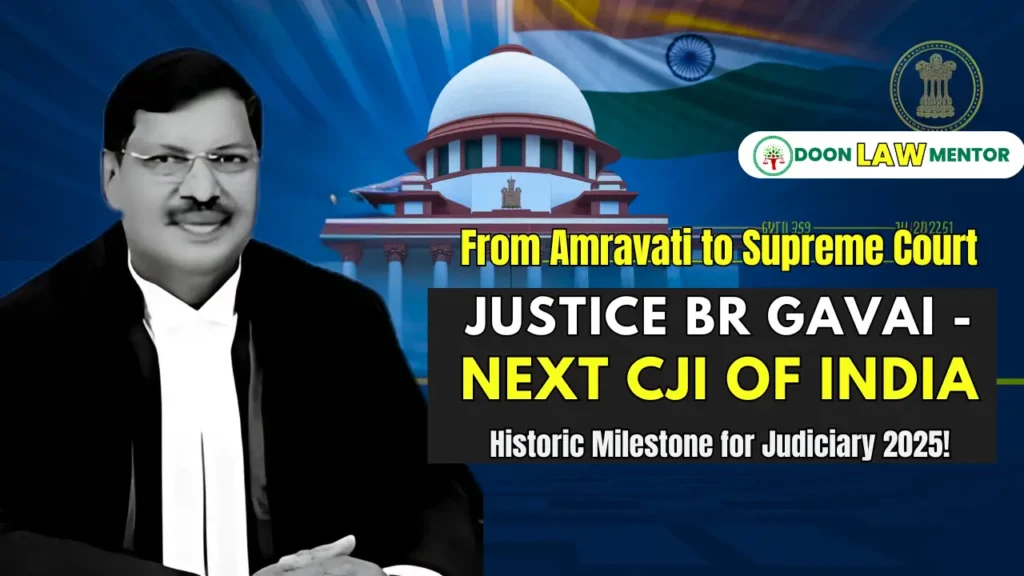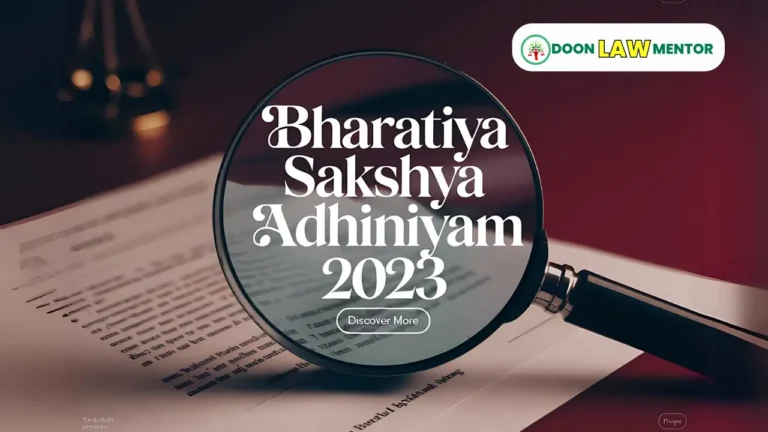Justice BR Gavai will be the next Chief Justice of India, set to take oath on May 14, 2025, as the 52nd CJI. This historic appointment marks a significant moment for diversity in the judiciary. This blog explores Justice BR Gavai Next Chief Justice for Judiciary, APO, and JLO aspirants preparing for 2025 exams.
Table of Contents
Introduction
On April 16, 2025, Chief Justice of India (CJI) Sanjiv Khanna recommended Justice Bhushan Ramkrishna Gavai as his successor, setting the stage for Justice BR Gavai Next Chief Justice of India. Justice Gavai is slated to take oath as the 52nd CJI on May 14, 2025, following CJI Khanna’s retirement on May 13. This appointment is a historic milestone, as Justice Gavai will be only the second Scheduled Caste individual to hold this prestigious position, following Justice KG Balakrishnan, who served from 2007 to 2010.
With a distinguished career spanning nearly four decades, Justice Gavai has contributed to landmark judgments on issues like Article 370, demonetisation, and electoral bonds. For Judiciary, APO, and JLO aspirants, understanding Justice BR Gavai Next Chief Justice offers valuable insights into the judiciary’s evolving leadership and its impact on legal education and practice. This blog delves into Justice Gavai’s background, career, notable rulings, and the significance of his appointment in 2025.
Who Is Justice BR Gavai?
Justice BR Gavai Next Chief Justice is a seasoned jurist whose journey reflects a deep commitment to justice, equality, and constitutional values. Let’s explore his background and career trajectory.
Early Life and Family Background
Born on November 24, 1960, in Amravati, Maharashtra, Justice Bhushan Ramkrishna Gavai hails from a family deeply rooted in social activism and public service. His father, RS Gavai, was a prominent leader of the Republican Party of India (RPI) and served as Governor of Bihar, Sikkim, and Kerala between 2006 and 2011. RS Gavai was also a Lok Sabha MP from Amravati in 1998 and a follower of Dr. BR Ambedkar, influencing the family’s commitment to Buddhism and social justice. Justice Gavai’s brother, Rajendra Gavai, is a politician, continuing the family’s legacy of public engagement. Inspired by his father’s unfulfilled dream of becoming a lawyer, Justice Gavai pursued law, a decision that shaped his illustrious career.
Education and Legal Career
Justice Gavai completed his Bachelor of Arts and Bachelor of Laws (BA LLB) from Nagpur University, laying a strong foundation in legal studies. He joined the Bar on March 16, 1985, and initially worked under the mentorship of the late Raja S Bhonsale, a former Advocate General and Judge of the Bombay High Court, until 1987. From 1987 to 1990, he practiced independently at the Bombay High Court, focusing on constitutional and administrative law.
After 1990, he primarily practiced at the Nagpur Bench of the Bombay High Court, representing various civic and educational bodies, including the Municipal Corporations of Nagpur and Amravati, Amravati University, and state-run corporations like SICOM and DCVL. Justice Gavai also served as Assistant Government Pleader and Additional Public Prosecutor at the Nagpur Bench from August 1992 to July 1993, and later as Government Pleader and Public Prosecutor starting January 17, 2000.
Judicial Career
Justice Gavai’s judicial career began when he was appointed as an Additional Judge of the Bombay High Court on November 14, 2003. He became a Permanent Judge on November 12, 2005, serving across benches in Mumbai, Nagpur, Aurangabad, and Panaji for over 15 years. On May 24, 2019, he was elevated to the Supreme Court of India, where he has since been recognized for his legal acumen and commitment to justice. As of April 16, 2025, Justice Gavai is the senior-most Supreme Court judge after CJI Sanjiv Khanna, positioning him as the next in line for the CJI role under the seniority convention.
Notable Judgments by Justice BR Gavai
Justice BR Gavai Next Chief Justice has been part of several landmark rulings that have shaped India’s legal landscape. Let’s examine some of his key contributions.
Article 370 Abrogation (2023)
Justice Gavai was a member of the five-judge Constitution Bench that unanimously upheld the Central Government’s 2019 decision to abrogate Article 370, which had granted special status to Jammu and Kashmir. The bench, which included CJI DY Chandrachud and Justices Sanjay Kishan Kaul, Sanjiv Khanna, and Surya Kant, validated the revocation and the subsequent bifurcation of the state into Union Territories. This verdict was a significant moment in India’s constitutional history, affirming the government’s authority to integrate Jammu and Kashmir fully into the Union.
Demonetisation Verdict (2023)
In Vivek Narayan Sharma v. Union of India (2023), Justice Gavai wrote the majority opinion for a five-judge bench that upheld the Central Government’s 2016 demonetisation of Rs. 1,000 and Rs. 500 currency notes. The 4:1 majority verdict, with Justice Gavai joined by Justices Arun Mishra, MR Shah, and BV Nagarathna, found that the government had consulted the Reserve Bank of India (RBI) and that the decision met the test of proportionality. This ruling addressed one of the most debated economic policies in recent Indian history, balancing executive authority with economic impact.
Electoral Bonds Scheme Annulment (2024)
Justice Gavai was part of another five-judge Constitution Bench that struck down the Electoral Bonds Scheme for political funding in 2024. The scheme, introduced in 2017, allowed anonymous donations to political parties, but the Court ruled it unconstitutional for violating the right to information under Article 19(1)(a). Justice Gavai, alongside CJI DY Chandrachud and Justices Sanjiv Khanna, JB Pardiwala, and Manoj Misra, emphasized the need for transparency in political funding to ensure democratic accountability, marking a significant step toward electoral reform.
Read More: 7 Daily Habits of Top Judiciary Exam Rankers in 2025: Secrets to Success
Scheduled Castes Sub-Classification (2024)
In a seven-judge Constitution Bench ruling, Justice Gavai contributed to a 6:1 majority decision that states have the constitutional authority to create sub-classifications within Scheduled Castes for targeted reservations. The bench held that such sub-classifications are permissible to uplift the most backward castes within the Scheduled Castes, addressing social and educational disparities. This verdict reinforced the principle of protective discrimination under Article 15(4) of the Constitution, promoting equity within marginalized communities.
Bulldozer Actions Unconstitutional (2024)
In Directions in the Matter of Demolition of Structures, In Re (2024 SCC OnLine SC 3291), Justice Gavai, alongside Justice KV Viswanathan, condemned the practice of “bulldozer justice.” The bench ruled that properties of accused or convicted individuals cannot be demolished by the state simply on those grounds, as it violates due process. The Court laid down stringent norms, including a prior show-cause notice and a 15-day response period, to curb such actions, reinforcing the principle that the executive cannot act as a judge.
Read More: Wife Can Join Husband’s Defamation Suit : Supreme Court
Prashant Bhushan Contempt Case (2020)
Justice Gavai was part of the bench that handled the high-profile contempt case against advocate Prashant Bhushan, addressing critical issues of free speech and judicial accountability. While the case stirred debate, Justice Gavai’s involvement highlighted his role in navigating complex legal and ethical questions, balancing judicial authority with constitutional rights.
Significance of Justice BR Gavai’s Appointment as CJI
The appointment of Justice BR Gavai Next Chief Justice on May 14, 2025, holds profound significance for the Indian judiciary and society at large. Let’s explore its impact.
A Milestone for Diversity
Justice Gavai will be the second Scheduled Caste individual to serve as CJI, following Justice KG Balakrishnan (2007-2010). This milestone underscores the judiciary’s commitment to diversity and representation, reflecting the inclusive vision of India’s Constitution. As a Dalit jurist, Justice Gavai’s appointment sends a powerful message about breaking barriers and fostering equality, aligning with the values championed by Dr. BR Ambedkar, whom his family deeply admired.
A Short but Impactful Tenure
Justice Gavai’s tenure as CJI will last just over six months, from May 14 to November 23, 2025, when he retires at the age of 65. Despite its brevity, his term is expected to be impactful, given his track record of contributing to landmark judgments and his administrative roles as Chancellor of Maharashtra National Law University, Nagpur, and Executive Chairman of the National Legal Services Authority (NALSA). Justice Gavai’s leadership will likely focus on enhancing access to justice, as seen in his prior work with NALSA, and addressing pressing legal issues like judicial reforms and backlog reduction.
A Voice for Constitutional Values
Throughout his career, Justice Gavai has been a staunch defender of constitutional values, particularly individual liberty and equality. His rulings on Article 370, demonetisation, and bulldozer justice demonstrate a balanced approach, upholding executive actions when legally sound while protecting fundamental rights against state overreach. As CJI, Justice BR Gavai Next Chief Justice is expected to continue this legacy, potentially influencing key cases on social justice, environmental protection, and forest rights, as he is currently heading a bench on these matters.
Inspiration for Marginalized Communities
Justice Gavai’s elevation to CJI is an inspiration for marginalized communities, showing that dedication and merit can overcome systemic barriers. His family’s history of social activism and his personal journey from Amravati to the Supreme Court highlight the transformative power of education and perseverance, resonating with the principles of inclusivity enshrined in the Constitution.
What Does This Mean for Law Students and Aspirants?
The appointment of Justice BR Gavai Next Chief Justice has significant implications for law students, particularly those preparing for competitive exams like Judiciary, APO, and JLO in 2025. Let’s break down its impact.
Focus on Landmark Judgments
Justice Gavai’s notable rulings, such as those on Article 370, demonetisation, and electoral bonds, are likely to be key topics in your 2025 exams. Study these cases to understand their constitutional and legal implications. For example, the Article 370 verdict offers insights into federalism and executive power, while the bulldozer justice ruling highlights due process under Article 21. These cases are essential for both Prelims and Mains, providing rich material for essays and case law analysis.
Emphasis on Social Justice
As a Scheduled Caste jurist, Justice Gavai’s tenure may bring renewed focus on social justice issues, such as reservations and protective discrimination. His ruling on sub-classification within Scheduled Castes reflects this commitment. For your exams, prepare topics like Article 15(4) and the principles of equality, as they may feature prominently in questions about recent judicial trends.
Access to Justice and NALSA
Justice Gavai’s role as Executive Chairman of NALSA emphasizes accessible legal aid, a topic relevant for exams. The SC Child Trafficking Guidelines SC 2025 case, which you previously studied, also underscores victim rights and judicial oversight, aligning with NALSA’s mission under Article 39-A. Familiarize yourself with NALSA’s initiatives, as they may be tested in questions about legal services and constitutional mandates.
Inspiration for Aspirants
Justice Gavai’s journey from a small town to CJI is a source of inspiration for aspirants, particularly those from marginalized backgrounds. His success highlights the importance of perseverance and merit, motivating you to stay focused on your 2025 exam preparation. Use his story to fuel your determination, especially when studying challenging topics like criminal law or constitutional law.
Why This Matters for Judiciary, APO, and JLO Aspirants
The appointment of Justice BR Gavai Next Chief Justice is highly relevant for your 2025 exams. For Prelims, know key details about Justice Gavai, such as his appointment date (May 14, 2025), tenure (until November 23, 2025), and notable rulings like Article 370 and demonetisation. For Mains, write essays on the significance of diversity in the judiciary, the role of NALSA in access to justice, or the impact of recent Supreme Court rulings on constitutional law, citing Justice Gavai’s contributions. For Interviews, discuss how Justice Gavai’s background and rulings reflect the judiciary’s commitment to equality and justice, using examples like the bulldozer justice guidelines.
Conclusion
The appointment of Justice BR Gavai Next Chief Justice on May 14, 2025, as the 52nd CJI marks a historic moment for India’s judiciary. As the second Scheduled Caste individual to hold this position, Justice Gavai brings a legacy of social justice and constitutional integrity to the role. His career, spanning nearly four decades, includes landmark rulings on Article 370, demonetisation, electoral bonds, and bulldozer justice, reflecting a balanced approach to executive authority and individual rights.
Despite a short tenure of six months, Justice BR Gavai Next Chief Justice is poised to leave a lasting impact through his leadership in NALSA, focus on social justice, and potential rulings on critical issues. For Judiciary, APO, and JLO aspirants, this appointment offers valuable lessons on diversity, constitutional law, and access to justice—key topics for your 2025 exams. Study Justice Gavai’s contributions to excel in your preparation and contribute to a more inclusive legal future. Start preparing with Justice BR Gavai Next Chief Justice insights today to reach your goals in 2025!
Call-to-Action
Learn about Justice BR Gavai Next Chief Justice for your 2025 exams! Join Doon Law Mentor’s Courses for help. Follow @doonlawmentor on Instagram for daily updates!
FAQs
- Who is Justice BR Gavai Next Chief Justice of India?
Justice BR Gavai will become the 52nd CJI on May 14, 2025, succeeding CJI Sanjiv Khanna. - When will Justice BR Gavai Next Chief Justice take oath?
He will take oath on May 14, 2025, a day after CJI Sanjiv Khanna retires on May 13. - What is the tenure of Justice BR Gavai Next Chief Justice?
His tenure will last just over six months, from May 14 to November 23, 2025, when he retires at 65. - Why is Justice BR Gavai Next Chief Justice appointment historic?
He will be the second Scheduled Caste CJI, following Justice KG Balakrishnan, marking a milestone for diversity. - What are some notable rulings by Justice BR Gavai Next Chief Justice?
He contributed to rulings on Article 370 abrogation, demonetisation, electoral bonds, and bulldozer justice. - What is Justice Gavai’s background in the Justice BR Gavai Next Chief Justice context?
Born in Amravati, he hails from a Scheduled Caste family, joined the Bar in 1985, and practiced constitutional law. - How does Justice BR Gavai Next Chief Justice impact social justice?
His rulings, like sub-classification within Scheduled Castes, promote equality and protective discrimination. - What roles does Justice BR Gavai Next Chief Justice hold outside the bench?
He is Chancellor of Maharashtra National Law University, Nagpur, and Executive Chairman of NALSA. - How can aspirants prepare with Justice BR Gavai Next Chief Justice rulings?
Study his landmark judgments on Article 370 and demonetisation for Prelims and Mains in 2025 exams. - Why is Justice BR Gavai Next Chief Justice important for aspirants?
His appointment highlights diversity, social justice, and constitutional law, key topics for your 2025 exams.
#DoonLawMentor #JusticeBRGavai #52ndCJI #SupremeCourtIndia #Judiciary2025 #LawStudentsIndia #CurrentLegalAffairs #CJIAppointment #Article370Verdict #ElectoralBondJudgment #GavaiJudgments #LegalAwarenessIndia #JudiciaryPrep #nextcji #nextchiefjusticeofindia









